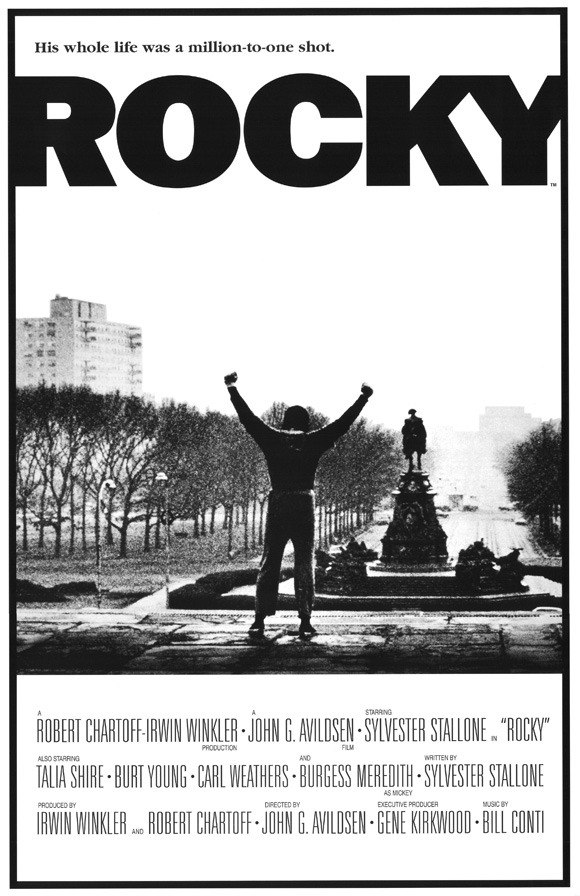Review of Rocky, Directed by John D. Avildsen
By ALEXIS NEAL
I feel a little silly describing the plot of Rocky (1976). Still, I know there may be a few young whippersnappers out there who never sat around on Saturday afternoons watching old action movies on TNT and who thus don’t know who this Sylvester Stallone guy is or why people get so excited when he pops up on their movie screens in otherwise unremarkable films like The Expendables (2010) or the much improved (if unimpressively named) sequel, The Expendables 2 (2012). Or perhaps there are some out there who never really got the appeal of sports flicks like Rocky or Rudy (1993) or Knute Rockne, All American (1940), and so never made it a point to bask in the awesome glory that is Mr. Stallone’s breakout film (and brainchild, but we’ll get to that in a minute). It seems rather unlikely that such viewers would be reading this particular review, but just in case, here you go:
Rocky Balboa is a boxer for just one reason: he can’t sing or dance. Boxing is, at it happens, the only thing he’s ever been even marginally good at. He’s certainly not bright, not by a longshot. And he’s far too kindhearted to be much good at his day job as an enforcer for a neighborhood loan shark. Even his romantic overtures to the profoundly shy Adrian are awkward and largely ineffectual. Truth be told, he’s not even that good a boxer—you can’t call him a has-been, for the simple reason that he never was. But all that changes when world heavyweight champion Apollo Creed comes to town looking for an opponent for his big Bicentennial Bout. With his original opponent was injured and unable to fight, Apollo has hit on the brilliant P.R. stunt of giving a local Philadelphia boy a shot at the title. And wouldn’t you know it, he picks our favorite down-on-his-luck fighter, one Rocky Balboa, a.k.a. “The Italian Stallion.” Major training montages ensue (with appropriate musical accompaniment), as Rocky prepares for the fight of his life, and a chance to prove he’s just as good as everybody else.
If there’s a more quintessentially American film than Rocky, I don’t know what it is. Americans love a good rags-to-riches tale, and there aren’t many things we like better than rooting for a scrappy guy who faces insurmountable odds. It’s part of our history. We are the scrappy no-accounts who, armed with little more than our own determination, stood toe-to-toe with one of the greatest empires in the world and emerged as an independent nation. Or so the story goes.
Even the making of Rocky is itself a rags-to-riches story. Stallone had been trying to make it in Hollywood for a while with minimal success (his ‘roles’ tended to be in rather disreputable films, if you know what I mean). When the idea for Rocky struck him, he was flat broke, and he had to sell his dog in order to buy the typewriter on which he wrote the screenplay. He even found a buyer who was willing to let him play the lead. And what do you suppose he did with the money they paid him for the script? He tried to buy his dog back. Only the guy who bought the dog wouldn’t sell him back until Stallone offered him $15,000 and a part in the movie (he plays the guy who sweeps the floors at Mickey’s gym). The dog is in the movie, too, as Rocky’s own pet pooch, Butkus. The film had a shoestring budget of $1 million, and went on to earn more than $200 million and ten Oscar nominations, including two for Stallone (for acting and screenwriting), and a win for Best Picture and Best Director. Stallone didn’t win the statuette, but, like Rocky, he showed the world that he could stand with the best. And, of course, the film spawned five sequels and rocketed Stallone to stardom—he went on to establish another major franchise (Rambo, spanning four films) and star in an assortment of action films (Demolition Man (1993), Tango and Cash (1989), and the aforementioned The Expendables 2, just to name a few of the better ones).
We Americans just love this stuff. Our national mascot should really be an underdog, because boy, do we love to watch a longshot make good. It’s part of who we are and how we see ourselves.
But we don’t just love it in our history and our films. We also love it in our religion. And that can lead to problems. Rocky Balboa is a nobody who’s given a second chance (or really a first chance, as it’s not clear he ever really had a shot at anything big time), and by hard work and sheer determination he shows the world that, by golly, he’s good enough, he’s smart enough (well, kind of), and, doggone it, people like him. And we import this same mentality into our picture of God and the gospel. Sure, maybe we blew it the first time around. Maybe we didn’t do ‘as well as we should have’. Maybe we screwed up. But God is the God of second chances, right? We figure if He’ll just give us another shot, we’re sure we can buckle down and do right. We’re Americans, and we’ve got gumption and pluck and we will not be denied. Just give us one more chance, God, and we’ll prove to You that we deserve Your favor.
But what is merely a harmless preference in entertainment is absolutely fatal when it comes to our faith. We are fundamentally mistaken about our past, our potential, and our position, and as a result, we are believing a false gospel.
Our past behaviors are not merely mistakes and missed opportunities; they are active rebellion against the God of the universe, who made us and loved us and blessed us. And in return for His lovingkindness, we essentially spat in His face. The Bible likens our behavior not to an athlete who didn’t train hard enough, but to an impoverished orphan bride who regularly—and flagrantly—cheats on the husband who saved her from the gutter and has lavished countless gifts upon her. (Ezekiel 16) This is our past. We have no standing to ask for any second (or third, or fourth) chance—we deserve punishment.
And even if such a chance were given, it would be useless to us, as our potential is similarly marked by sin. No matter how many chances God gives us, we still screw up. We simply cannot ‘make good’, no matter how hard we try. (Romans 3:10-20) Sin is in our very bones, and it will taint all we do. We don’t just need a second chance; we need a new heart. (Ezekiel 11:19-20)
Because of this very real sin problem, our position is and always will be one of opposition to God. We are not just faltering-but-well-intentioned children; we are His enemies, and He is right to punish us, to wipe us out for our rebellion and treachery. (Colossians 1:21)
But instead—instead!—He sent His only Son to take upon Himself the penalty for our sin and to bestow upon us the blessing of His righteous life. Now, when God looks at believers, He does not see sinful rebels, but the perfect holiness of His own Son. (Romans 3:21-26) This is the true gospel, not that He gave us a chance to earn His favor, to earn blessing, but that He earned it for us when all we deserved was wrath. And then He gave it to us, not because of anything we had done, but because of who He is. And in so doing, He changes us from enemies into allies. (Ephesians 2:13-14) As one of the folks over at the White Horse Inn so wisely observed, God is not the God of second chances; He is the God of second lives.
So while we’re free to continue enjoying our all-American scrappy underdog stories—and I for one fully intend to do so—when it comes to matters of faith, we say with well-known hymn-writer Horatius Bonar:
Not what my hands have done can save my guilty soul;
Not what my toiling flesh has borne can make my spirit whole.
Not what I feel or do can give me peace with God;
Not all my prayers and sighs and tears can bear my awful load. […]
I praise the God of grace; I trust His truth and might;
He calls me His, I call Him mine, My God, my joy and light.
’Tis He Who saveth me, and freely pardon gives;
I love because He loveth me, I live because He lives.
_______________________________________________________________
Alexis Neal is an attorney in the Washington, D.C., area. She regularly reviews young adult literature at www.childrensbooksandreviews.com and everything else at quantum-meruit.blogspot.com.












